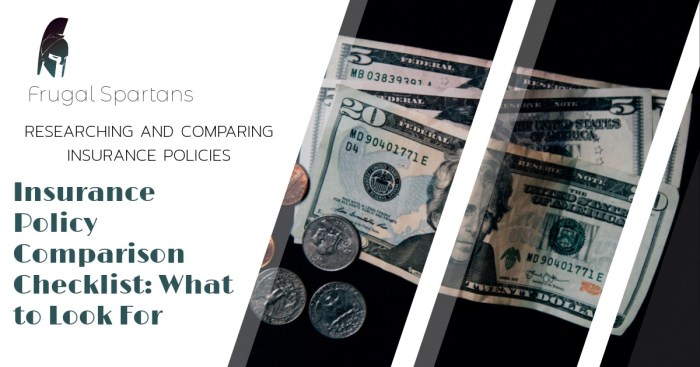Get ready to dive into the world of insurance comparison tips, where savvy consumers navigate the complex landscape of policies to secure the best deals. From deciphering policy details to utilizing comparison tools, we’ve got you covered with everything you need to know.
Importance of Insurance Comparison: Insurance Comparison Tips

When it comes to choosing an insurance policy, comparing your options is absolutely essential. By taking the time to compare different insurance policies, consumers can ensure they are getting the best coverage at the most affordable rates. This can ultimately lead to significant savings and better protection for you and your belongings.
Finding the Best Coverage
- Insurance policies can vary greatly in terms of coverage limits, exclusions, and deductibles. By comparing different policies, individuals can find one that best suits their needs and provides the coverage they require.
- Comparing insurance options also allows consumers to identify any gaps in coverage and make sure they are adequately protected in case of an emergency or unforeseen event.
Affordable Rates
- Insurance premiums can vary widely between providers for the same level of coverage. By comparing rates, individuals can find the most cost-effective option that fits within their budget.
- Additionally, some insurance companies may offer discounts or special promotions that can further reduce the cost of coverage. By comparing options, consumers can take advantage of these savings opportunities.
Potential Savings
- One of the biggest benefits of insurance comparison is the potential for significant savings. By choosing a policy with lower premiums or better discounts, individuals can save hundreds or even thousands of dollars each year.
- Over time, these savings can add up, providing financial security and peace of mind knowing that you are getting the best value for your insurance coverage.
Factors to Consider
When comparing insurance policies, there are several key factors to take into consideration to make an informed decision. From coverage and premiums to deductibles and exclusions, each aspect plays a crucial role in determining the best policy for your needs.
Coverage and Policy Limits
- One of the most important factors to consider is the extent of coverage offered by each policy. Ensure that the policy covers all your needs, such as medical expenses, property damage, or liability protection.
- Policy limits also play a significant role in your decision-making process. Make sure the limits are sufficient to cover potential losses without leaving you financially vulnerable.
Premiums and Deductibles
- Compare the premiums of different insurance policies to find one that fits within your budget. Keep in mind that lower premiums may come with higher deductibles, so strike a balance between premium costs and out-of-pocket expenses.
- Consider the deductibles of each policy, as this is the amount you will have to pay before your insurance coverage kicks in. Choose a deductible that you can comfortably afford in case of a claim.
Exclusions and Coverage Types
- Pay close attention to the exclusions listed in the insurance policy, as these are situations or items that are not covered. Ensure that the exclusions do not leave you vulnerable to unexpected expenses.
- Understand the different types of coverage offered, such as comprehensive, liability, or collision coverage. Choose the types of coverage that align with your needs and provide adequate protection.
Customer Reviews and Ratings
- Evaluate customer reviews and ratings of insurance providers to get a sense of their reputation and customer service quality. Positive reviews can indicate reliability and prompt claims processing, while negative reviews may signal potential red flags.
- Consider the overall satisfaction levels of customers and any recurring issues mentioned in reviews to make an informed decision about the insurance provider.
Understanding Policy Details
When comparing insurance policies, one crucial aspect to consider is understanding the policy details. This involves thoroughly reading and comprehending the fine print to grasp the coverage, inclusions, exclusions, and limitations of each policy.
Importance of Reading Policy Details, Insurance comparison tips
- Reading the fine print helps you understand what is covered under the policy and what is not. It prevents any surprises or misunderstandings when filing a claim.
- Knowing the limitations and exclusions of a policy can help you determine if it aligns with your specific needs and requirements.
- Understanding the policy details enables you to make an informed decision and choose the insurance plan that offers the most suitable coverage for your situation.
Tips for Comparing Policy Details
- Compare the inclusions of each policy to see which one offers comprehensive coverage for your needs.
- Pay close attention to the exclusions to understand what situations or items are not covered by the insurance.
- Review the limitations of each policy to determine any restrictions or conditions that may affect your coverage.
Consequences of Overlooking Policy Details
- Overlooking important policy details can result in unexpected out-of-pocket costs if a claim is denied due to a misunderstanding of the coverage.
- Ignores the exclusions and limitations can lead to gaps in coverage, leaving you vulnerable in certain situations.
- Failing to read the fine print may result in choosing a policy that does not fully meet your needs, resulting in dissatisfaction during a claim process.
Utilizing Comparison Tools

When it comes to finding the best insurance deal, utilizing comparison tools can make the process a whole lot easier. These online tools and websites are designed to help you compare different insurance policies and providers in one place, saving you time and effort.
Benefits of Using Comparison Tools
- Save Time: Instead of visiting multiple websites or contacting various insurance companies individually, comparison tools allow you to see all your options in one convenient location.
- Save Money: By comparing prices and coverage options side by side, you can easily identify the most cost-effective insurance policy that meets your needs.
- Easy Comparison: These tools provide a clear breakdown of different policies, making it easier to understand the benefits, exclusions, and limitations of each plan.
- Customization: Many comparison tools allow you to input your specific details and preferences, generating personalized insurance quotes tailored to your requirements.
Effectively Utilizing Comparison Tools
When using comparison tools, make sure to input accurate information about your coverage needs, driving history, and personal details to receive the most precise quotes.
- Compare Apples to Apples: Ensure that you are comparing similar policies with the same coverage limits and deductibles to get a true price comparison.
- Read Reviews: Take advantage of customer reviews and ratings provided on these comparison websites to gauge the reputation and customer service of different insurance companies.
- Ask Questions: If you come across any terms or conditions that are unclear, don’t hesitate to reach out to the insurance providers or the comparison tool’s customer service for clarification.
- Stay Updated: Insurance rates and policies can change frequently, so it’s essential to revisit comparison tools periodically to ensure you have the most up-to-date information.





